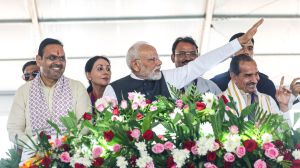Kem chho! It’s time to play Kenya
Half an hour spent at the Kenya nets this afternoon carried this reporter back to his days covering Ranji Trophy cricket in Ahmedabad and Ra...

Half an hour spent at the Kenya nets this afternoon carried this reporter back to his days covering Ranji Trophy cricket in Ahmedabad and Rajkot. The lingua franca was Gujarati — all kem chho, majama and saaru chhe. But the heart that beats behind that is unmistakably wedded to the Kenyan cause.
When they square off tomorrow against their friends, heroes and sometime countrymen, Messrs Hitesh Modi, Ravindu Shah, Asif Karim and Brijal Patel will shake hands and then get around to trying to knock the stuffing out of their opponents.
|
Ravindu Shah
|
‘‘It’s not easy being friends at this level’’, says Hitesh Modi, the most successful Kenyan batsman in the World Cup so far. ‘‘We are friends beyond the boundary line but in the middle it is very competitive.’’
Modi — whose family owns a house in Jamnagar and who has close relatives in Porbandar — is on good terms with the likes of Yuvraj, Harbhajan and Rahul Dravid. ‘‘I take them out when they are in Nairobi; the last time the team was there Dravid had dinner at my place’’, he said.
But talk cricket and they claim to be different. They walk the African walk and play in an un-Indian style. But when on the field this bunch of Kenyans are no different from the rest. As Asif Karim, at 39 the elder statesman of this team, says, ‘‘We are not wrist players like the Indians; we play more strokes with the straight bat and play straight.’’
That said, the Indian influence is an undeniable presence. Brijal Patel (25), who isn’t aware of which town he hails from but knows the state well, points to the more contemporary and direct cricket connection. ‘‘Our coach Sandeep Patil has now been connected to Kenyan cricket for more than 14 years.’’ He goes on to add the influence of the likes of Balwinder Singh Sandhu and Chandrakant Pandit, who played in the same club as him.
|
Brijal Patel
|
Karim has been a mainstay in the Kenyans and, with his off-spin bowling, has often come to Kenya’s rescue. Is it easy for those of Indian origin to make the national side? ‘‘Why cricket, I was also part of the Davis Cup team and played against Egypt,’’ he says in his heavy Kutchi accent. Sadly, it seems the supply line of Indians to Kenyan cricket is drying up. There isn’t much Indian talent waiting in the wings, Modi says. Karim gives details of how broke for talent they are: ‘‘Before the cup we had to name a list of 30 players but we could manage just 21. If today we have to field a second team it will be virtually impossible.’’
Why? Karim answers as a true Gujarati, rubbing thumb and index finger together: ‘‘Paisa’’. Rather, lack of it. ‘‘There are just a handful of players who are on contract; the rest have do jobs or run the family business.’’ One question that begs to be asked: Do they think they’d have played cricket at this level if they’d been in India? Asif Karim smiles a wistful smile before Gujarati confidence gets the better of him. ‘‘Difficult question but chances are that I would have actually made it.’’
As they leave for their hotel, they are asked a final question: how do they feel about the fact that a team with so many handicaps could acually be playing in the semi-finals? Modi laughs. ‘‘Why semis, we can go all the way.’’
Then adds, with an aavjo (bye), ‘‘We Gujaratis always dream big as you know.’’




- 01
- 02
- 03
- 04
- 05


























